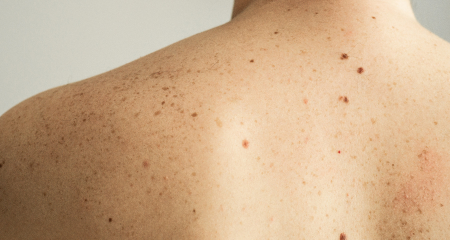
Skin cancer is the most prevalent form of cancer in the United States, with one out of every three individuals in Texas being affected. The board-certified dermatologists at Northstar Dermatology specialize in full-body screenings to identify skin cancer, and are expert trained in the surgical treatment of all forms of skin cancer. Prevention and early detection of skin cancer is key, and our team is dedicated to educating patients on best practices to reduce the risks of developing skin cancer.
While most people are familiar with Melanoma skin cancer, Melanoma is actually the rarer form of skin cancer. Basal Cell Carcinoma and Squamous Cell Carcinoma affect significantly more individuals than Melanoma
Basal Cell Carcinoma is the most common form of skin cancer. While it is not a lethal form of skin cancer, if left untreated, the cancerous lesion will continue to grow in size and invade surrounding tissues. Basal Cell Carcinoma is typically caused by prolonged exposure to UV light (from the sun and/or indoor
tanning). Those with lighter skin tones, a history of sun burns, red-hair or freckles can be more susceptible to developing Basal Cell Carcinoma. People who work outdoors or live in places with yearround sun are also at increased risk for skin cancer. If you notice a spot that isn’t healing, or a scaly patch of skin that won’t go away, it could be a sign of Basal Cell. Contact your board-certified dermatologist for an expert evaluation and assessment.
Squamous Cell Carcinoma is the second most common type of skin cancer. Squamous Cell is also a result of exposure to UV light (from the sun and/or indoor tanning). Unlike Basal Cell Carcinoma, this type of skin cancer has the potential to spread to other parts of the body, which could cause death. Fortunately,
Squamous Cell Carcinoma is slow growing, but nevertheless, it is important to seek out treatment early to prevent metastasizing. Squamous Cell Carcinoma can present as a spot that isn’t healing, a scaly patch of skin that won’t go away, or a wart-like spot. If you notice any of these symptoms, or any new or changing spots, be sure to contact your board-certified dermatologist for evaluation.
The physicians at Northstar Dermatology specialize in surgical treatment of all forms of skin cancer. The most common method of treatment is surgical excision, where the dermatologist will surgically remove the cancerous tissue as well as a margin of tissue around the lesion to ensure complete clearance. The area is closed with sutures and some downtime will be required, including restrictions of lifting and physical activity for a couple weeks.
Other non-surgical forms of treatment for more superficial or early-stage skin cancers may include a procedure called Electrodessication and Curettage or chemotherapy injections. Some larger skin cancers, or cancers in cosmetically sensitive areas, may require a referral from your dermatologist to a Mohs surgeon for surgical removal.
A Skin Cancer Screening is a thorough, head-to-toe check to look for any suspicious spots or potential skin cancers. Once you are placed in a gown, our specialist will begin a thorough examination of the skin to identify all “spots” found. Some lesions may be checked using a dermatoscope, or a special magnifying light which can be used to see the characteristics of the skin up-close.
If any lesions are found to be suspicious for skin cancer or abnormality, your specialist may recommend a skin biopsy to confirm the diagnosis. Biopsies are a quick procedure in which a sample of the lesion is removed and sent to a lab for examination. Pre-cancerous spots (actinic keratoses) and certain benign lesions may also be treated during skin cancer screenings.
Skin Cancer screenings are exclusively dedicated to checking for potential skin cancers and educating patients on the different lesions found on exam, so other concerns such as acne or rashes will typically require a separate appointment.
Skin cancer screenings are beneficial for everyone, no matter the skin type. However, some people have certain features or factors which increase the risk for developing skin cancer:
• Family history of skin cancer
• Personal history of sunburns, especially blistering sunburns
• Personal history of extended sun exposure (working outdoors, outdoor sports, outdoor
recreation such as boating, pool, beach, etc.)
• Personal history of indoor tanning
• Fair complexion
• Red hair or light hair
• A plethora of moles
If any of the above are applicable to you, it is imperative that you request a head-to-toe skin cancer screening
